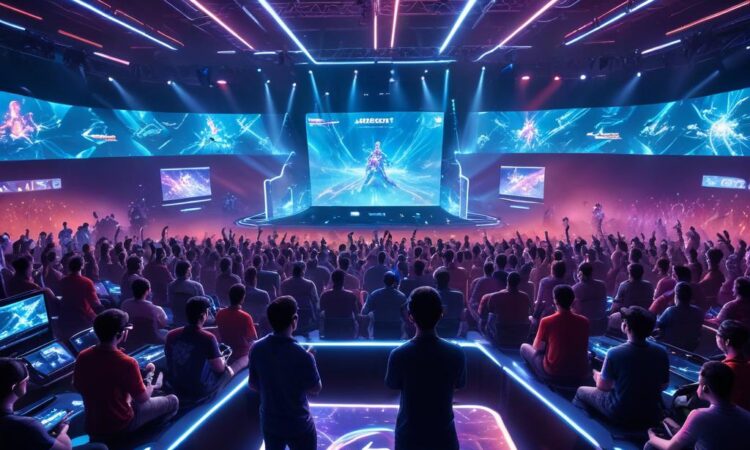Esports in the Metaverse: A Revolution in Virtual and Augmented Reality
The world of esports is experiencing a seismic shift, driven by the burgeoning potential of virtual reality (VR) and augmented reality (AR) technologies. The metaverse, a nascent digital realm where users can interact within immersive virtual environments, promises to transform esports, offering unparalleled opportunities for immersive experiences, innovative game formats, and enhanced fan engagement.
Immersive Experiences: Beyond the Screen
One of the most significant impacts of VR and AR on esports is the ability to create truly immersive experiences. VR headsets transport players into virtual worlds, allowing them to feel physically present in the game environment. This level of immersion enhances the competitive experience, fostering a deeper connection between players and the game.
Imagine a first-person shooter where players not only see the virtual battlefield but also feel the recoil of their weapons, the impact of bullets, and the adrenaline rush of combat. This visceral, sensory-rich experience can elevate the intensity and realism of competitive gaming, making it even more engaging for both players and spectators.
AR, on the other hand, overlays digital elements onto the real world, offering a unique blend of virtual and physical experiences. AR-enabled esports can seamlessly integrate real-world environments with digital gameplay, creating opportunities for novel game formats and interactions.
For example, imagine a strategy game where players use AR to view virtual maps superimposed on their physical surroundings, allowing them to strategize and execute tactics in a real-world setting. This fusion of the physical and digital realms can redefine the boundaries of esports, bringing a new dimension of interactivity and realism to the genre.
New Game Formats: Breaking the Mold
The immersive capabilities of VR and AR technologies are opening up exciting possibilities for developing innovative game formats. Traditional esports often rely on established genres like first-person shooters, strategy games, and fighting games. The metaverse, however, allows for the creation of entirely new game formats that leverage the unique features of VR and AR.
One such format is virtual sports, where players compete in virtual versions of real-world sports like soccer, basketball, and racing. VR sports can provide a more engaging and realistic experience than traditional video game simulations, offering greater control and immersion for players.
Another emerging format is augmented reality esports, which blends virtual elements with the real world. This can take the form of AR-based obstacle courses, where players use their phones or AR headsets to navigate virtual obstacles in a physical environment. Or it could involve AR-enhanced combat games, where players engage in virtual battles within their actual surroundings.
These new formats offer a departure from traditional esports, providing fresh and exciting ways to compete and engage with audiences. They cater to a wider range of interests and skillsets, fostering greater inclusivity within the esports community.
Fan Engagement: A New Era of Interaction
The metaverse also holds the potential to revolutionize fan engagement in esports. VR and AR technologies allow for more interactive and immersive viewing experiences, breaking down the barriers between players and spectators.
Imagine watching an esports tournament from the perspective of a virtual spectator in the arena, allowing you to experience the excitement and atmosphere firsthand. VR headsets can transport fans to virtual stadiums, providing a front-row seat to the action with realistic sound effects and visual effects.
AR can also enhance fan engagement by overlaying real-time stats and player information onto the real-world environment. Fans can use their smartphones or AR headsets to access interactive maps, player profiles, and other game-related information, creating a more immersive and engaging viewing experience.
The metaverse allows for greater interaction between fans and players. Fans can engage in virtual meet-and-greets with their favorite players, participate in Q&A sessions, and even compete against their idols in virtual challenges. This level of interaction can foster a stronger sense of community and connection within the esports ecosystem.
Challenges and Opportunities: Embracing the Metaverse
While the potential of VR and AR for esports is immense, several challenges need to be addressed to fully realize its transformative power.
One significant challenge is the accessibility of VR and AR technologies. Currently, VR headsets and AR devices can be expensive, limiting their accessibility to a broader audience. However, as these technologies mature and become more affordable, their adoption in esports is expected to increase.
Another challenge is the development of compelling and engaging game formats that take full advantage of the capabilities of VR and AR. Game developers need to create immersive and innovative experiences that cater to the specific needs of these technologies.
Despite these challenges, the opportunities presented by the metaverse are too vast to ignore. By embracing VR and AR, esports can tap into a new wave of innovation and engagement, opening up a world of possibilities for players, fans, and the industry as a whole.
Conclusion: A New Frontier for Esports
The metaverse, fueled by VR and AR technologies, is poised to revolutionize esports, creating immersive experiences, innovative game formats, and enhanced fan engagement. By overcoming the existing challenges and embracing the potential of these technologies, esports can enter a new era of innovation, accessibility, and global reach.
As the metaverse continues to evolve, we can expect to see even more groundbreaking applications in esports, pushing the boundaries of what’s possible and captivating audiences worldwide. The future of esports is bright, and the metaverse promises to be a key driver of its continued growth and evolution.

